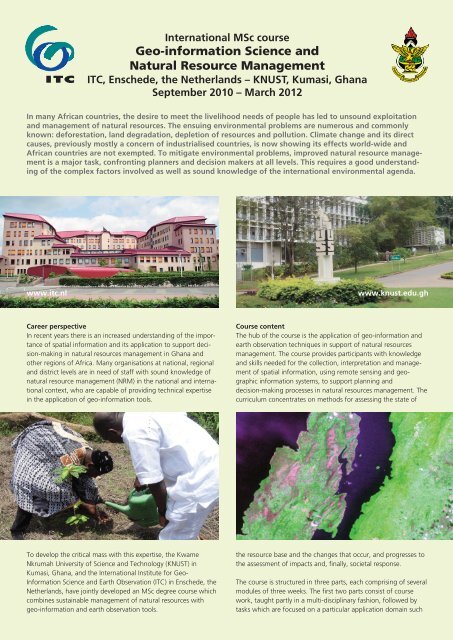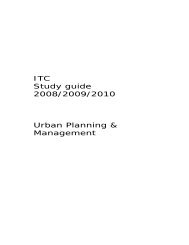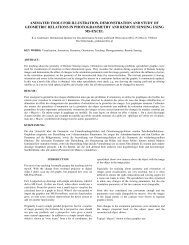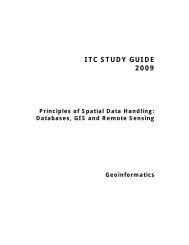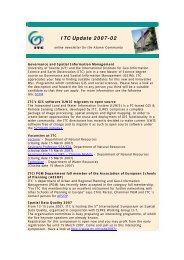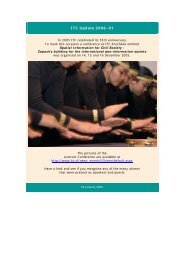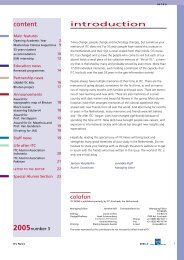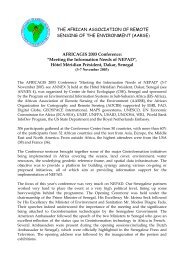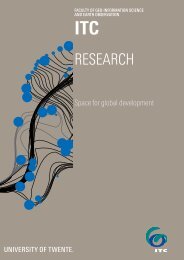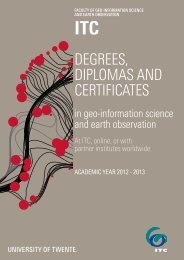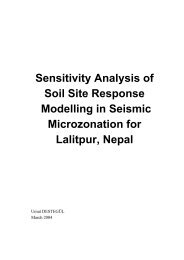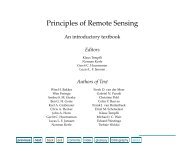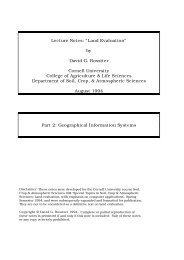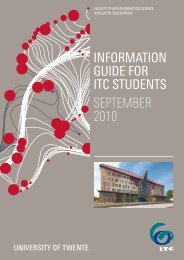KNUST Ghana-2009:ITC Leaflet
KNUST Ghana-2009:ITC Leaflet
KNUST Ghana-2009:ITC Leaflet
You also want an ePaper? Increase the reach of your titles
YUMPU automatically turns print PDFs into web optimized ePapers that Google loves.
International MSc course<br />
Geo-information Science and<br />
Natural Resource Management<br />
<strong>ITC</strong>, Enschede, the Netherlands – <strong>KNUST</strong>, Kumasi, <strong>Ghana</strong><br />
September 2010 – March 2012<br />
In many African countries, the desire to meet the livelihood needs of people has led to unsound exploitation<br />
and management of natural resources. The ensuing environmental problems are numerous and commonly<br />
known: deforestation, land degradation, depletion of resources and pollution. Climate change and its direct<br />
causes, previously mostly a concern of industrialised countries, is now showing its effects world-wide and<br />
African countries are not exempted. To mitigate environmental problems, improved natural resource management<br />
is a major task, confronting planners and decision makers at all levels. This requires a good understanding<br />
of the complex factors involved as well as sound knowledge of the international environmental agenda.<br />
www.itc.nl<br />
www.knust.edu.gh<br />
Career perspective<br />
In recent years there is an increased understanding of the importance<br />
of spatial information and its application to support decision-making<br />
in natural resources management in <strong>Ghana</strong> and<br />
other regions of Africa. Many organisations at national, regional<br />
and district levels are in need of staff with sound knowledge of<br />
natural resource management (NRM) in the national and international<br />
context, who are capable of providing technical expertise<br />
in the application of geo-information tools.<br />
Course content<br />
The hub of the course is the application of geo-information and<br />
earth observation techniques in support of natural resources<br />
management. The course provides participants with knowledge<br />
and skills needed for the collection, interpretation and management<br />
of spatial information, using remote sensing and geographic<br />
information systems, to support planning and<br />
decision-making processes in natural resources management. The<br />
curriculum concentrates on methods for assessing the state of<br />
To develop the critical mass with this expertise, the Kwame<br />
Nkrumah University of Science and Technology (<strong>KNUST</strong>) in<br />
Kumasi, <strong>Ghana</strong>, and the International Institute for Geo-<br />
Information Science and Earth Observation (<strong>ITC</strong>) in Enschede, the<br />
Netherlands, have jointly developed an MSc degree course which<br />
combines sustainable management of natural resources with<br />
geo-information and earth observation tools.<br />
the resource base and the changes that occur, and progresses to<br />
the assessment of impacts and, finally, societal response.<br />
The course is structured in three parts, each comprising of several<br />
modules of three weeks. The first two parts consist of course<br />
work, taught partly in a multi-disciplinary fashion, followed by<br />
tasks which are focused on a particular application domain such
sensing and GIS. The aim of <strong>ITC</strong>’s activities is the international<br />
exchange of knowledge, focusing on capacity building and institutional<br />
development in developing countries and emerging<br />
economies. To date <strong>ITC</strong> has more than 19,000 alumni in all parts<br />
of the world, some of whom are taking leading positions in their<br />
respective organisations. (For more information: www.itc.nl)<br />
as forestry, agriculture, environmental protection and wildlife<br />
management. Students can choose tasks in one or more application<br />
areas, depending on their interest and background. This<br />
approach allows students to develop their own profile against the<br />
broad background of NRM. In the third block participants carry<br />
out their individual MSc research work in a specific field.<br />
Starting date and duration<br />
The course starts in September 2010 and lasts for 18 months<br />
(five months in Enschede and thirteen months in Kumasi).<br />
Period and Location<br />
September - April<br />
Kumasi<br />
April - August<br />
Enschede<br />
September - March<br />
Kumasi<br />
Topics<br />
Principles and skills in GIS and remote<br />
sensing, natural resource management<br />
issues in <strong>Ghana</strong> and the region,<br />
GIS and remote sensing applications<br />
for environmental<br />
management<br />
Join other international students in<br />
Enschede for advanced course work in<br />
the application domain, research skills<br />
and methods, and proposal writing<br />
Conduct research: fieldwork and<br />
secondary data collection, data<br />
processing, analysis and thesis writing<br />
and defence<br />
Institutions involved<br />
The Kwame Nkrumah University of Science and Technology<br />
(<strong>KNUST</strong>) is located in the historic city of Kumasi, <strong>Ghana</strong>. It was<br />
established in August 1961 and is one of the five public universities<br />
and the only technological university in <strong>Ghana</strong>. <strong>KNUST</strong>’s revolutionary<br />
spirit is unique among <strong>Ghana</strong>’s universities. It draws<br />
exceptional students from around the country and other countries<br />
to its undergraduate and graduate schools. <strong>KNUST</strong> currently<br />
has about 20,000 students who are studying at the diploma,<br />
undergraduate, and postgraduate levels. The university has a spacious<br />
campus with ample accommodation for national and international<br />
students. Two colleges are involved in the course: the<br />
College of Agriculture and Natural Resources (CANR) and the<br />
College of Engineering (CE).<br />
For more information: www.knust.edu.nl<br />
The International Institute for Geo-Information Science and Earth<br />
Observation (<strong>ITC</strong>) established in 1950 is the largest institute for<br />
international higher education in the Netherlands. It provides<br />
international education, research and project services in the field<br />
of geo-information science and earth observation using remote<br />
<strong>ITC</strong> faculty of the University of Twente<br />
As of 1 January 2010, <strong>ITC</strong> will be a faculty (with special status) of<br />
the University of Twente (UT). The merger will be implemented in<br />
a way that preserves the distinctive character and mission of <strong>ITC</strong>.<br />
As a university faculty, <strong>ITC</strong> will be more firmly embedded in the<br />
Dutch academic education system. Furthermore, the integration<br />
with the University of Twente will lead to innovative research and<br />
education in areas such as energy, environment, climate change,<br />
water, geo-information and earth observation, and disaster management.<br />
The University of Twente is a modern, entrepreneurial university<br />
of technology. Its focus is on developing relevant modern technology,<br />
and this is made possible through collaboration between<br />
engineering, natural, social and behavioural sciences strongly<br />
embedded in disciplines and technologies.<br />
Who should apply?<br />
The course primarily caters for mid-career professionals, but is<br />
also open to recent graduates who want to continue for an MSc<br />
degree.<br />
Admission requirements<br />
• BSc degree in a first class or second class upper division or<br />
equivalent qualification in a relevant field<br />
• Proficiency in English<br />
• Eligibility for a visa of the Netherlands and <strong>Ghana</strong><br />
Cost<br />
Tuition fee: Euro 4,900. Additional costs: Euro 9,600.<br />
Note: Additional costs include books, health insurance, fieldwork<br />
and other student related costs such as accommodation and living<br />
cost. An international air ticket to the Netherlands is not<br />
included in the additional cost.<br />
Application deadlines<br />
Your applications should reach us before 1 July 2010.<br />
However, if you intend to apply for a fellowship from the<br />
Netherlands Fellowship Programme (NFP) your application should<br />
reach us before 15 January 2010.<br />
More information<br />
For further information contact:<br />
Dr. Samuel Oppong (<strong>KNUST</strong>)<br />
E: sko86@hotmail.com or kobbyoppong@yahoo.com<br />
T: +233-51-60 381 or +233-244-53 56 92<br />
I: www.knust.edu.gh<br />
or<br />
Ir. Louise van Leeuwen (<strong>ITC</strong>)<br />
E: vanleeuwen@itc.nl<br />
T: +31-53-4874 347 or +31-53-4874 240<br />
I: www.itc.nl/education<br />
<strong>ITC</strong> 250 - 0608<strong>2009</strong>


